Ten years ago, in late 2010 and early 2011, the Arab world experienced a series of convulsions that tore apart the Middle East as we knew it. Starting in Tunisia, where a young fruit vendor named Mohamed Bouazizi set himself on fire to protest corruption and police abuse, angry demonstrations spread throughout the region. Some of the world’s longest-ruling leaders were toppled within months. There was a sense of optimism, that the long-suffering citizens of Arab nations were finally rising up to demand basic human rights and dignity in secular, youth-led popular uprisings.
Observers in Israel were largely of a different mind. Tacit understandings and written agreements with Arab autocrats — demonstrably not with the masses — were long a foundation of Israel’s national security mindset. Now figures like Hosni Mubarak, who had maintained the peace treaty as eight Israel prime ministers came and went, were being pushed out, and Israel’s ties with the Arab world, both official and undeclared, were at risk of being undone by the Arab street that had never fully accepted them.
Unlike the wave of anti-Communist demonstrations that bolstered liberal democracy in the Eastern Bloc two decades earlier, in the Middle East Islamists would seize power from secular dictators, Israeli political and military leaders feared.
‘‘When some people in the West see what’s happening in Egypt, they see Europe 1989,’’ said an Israeli official. ‘‘We see it as Tehran 1979.’’
In many places, Israel’s fears became reality in short order. The Muslim Brotherhood and affiliated parties won elections in Morocco, Tunisia, and Egypt. Protests spread across Jordan, with which Israel has had a peace treaty since 1994 that is vital to maintaining quiet in the West Bank and over the Temple Mount. Jihadists were pouring into Syria, filling the vacuum left by the collapsing Syrian army, which had maintained calm along Israel’s Golan Heights frontier for decades despite the enmity between the countries.
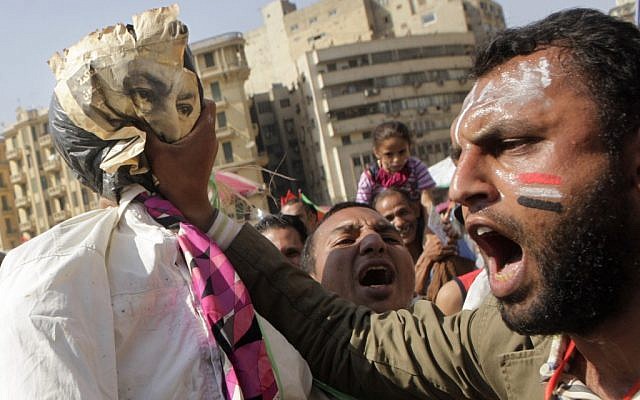
An Egyptian protester prepares to hang an effigy representing Hosni Mubarak at Tahrir Square (AP/Amr Nabil)
Israel was the big loser in what became known as the Arab Spring, argued both Israeli and international pundits.
A decade later — astonishingly — the headlines look very different. “Ten years on, the Arab Spring’s biggest winner is Israel,” wrote Haaretz’s Anshel Pfeffer in December. “Why Israel is now delighted about the Arab Spring,” reads a January Middle East Eye headline.
How did Israel manage to emerge from a complex, fast-moving, and dangerous upheaval as a “winner”?
The descent
Israel’s approach over the decades has been to seek security and stability, which usually came via Arab strongmen at the head of repressive regimes who could clamp down on violence against Israel. While itself committed to representative democracy, Jerusalem has no interest in weak democratically elected leaders subject to the will of an anti-Israel and sometimes anti-Semitic public.
Initially, the Arab Spring challenged that approach. Yet looking back a decade later, it is hard to recall the initial hope about the blossoming of democracy across the Arab world. Today, the region is traumatized by arguably its most destructive decade of the modern era, with a few fitful moves toward political freedom in some parts of the Middle East the only lasting legacies of the Arab Spring.
The failure of democracy to take hold may have been a tragedy for hundreds of millions of freedom-seeking Middle Easterners, but for Israel, located in what then-defense minister Ehud Barak described as a “bad neighborhood,” it meant one less thing to worry about.
But that did not mean Israel was home free. As spring turned to winter, the collapse of autocratic regimes created power vacuums that set in motion a series of negative developments on the ground that Prime Minister Benjamin Netanyahu and the IDF leadership had to confront.
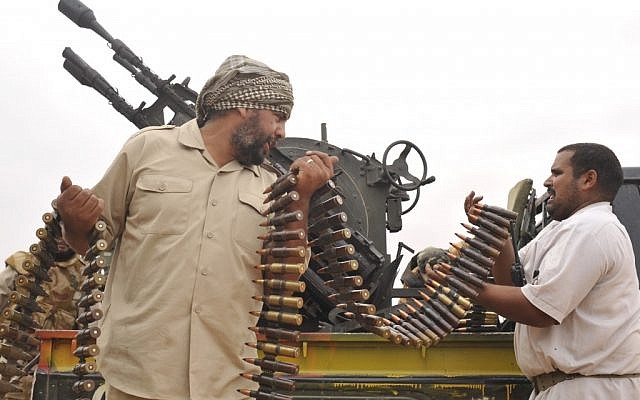
Libyan revolutionary fighters load their machine gun during an attack against pro-Gadhafi forces in 2011. (AP/Bela Szandelszky)
Iran took advantage of the collapse of traditional pillars of the Arab world to spread its influence through proxies and the Iranian Revolutionary Guards Corps’s Quds Force. Turkey, which had recently taken an overtly confrontational turn against Israel under prime minister (and later president) Recep Tayyip Erdogan, also took advantage of the upheaval by trying to position itself as the head of the Sunni Islamist camp. The stance gave Erdogan a platform as a leading critic of Israel and champion of the Palestinians, especially Hamas.
With time, Jerusalem also had to deal with the return to the region of Moscow, which had in the past supported Israel’s enemies and had even sent troops to fight Israeli forces on the battlefield.
In this environment, Israel had to make challenging decisions about whom to support, whom to strike, and how to maneuver a long period of consistent uncertainty.
Betrayal by Uncle Sam
Egyptian president Hosni Mubarak was a reliable partner for Israel since he assumed office in 1981. While Israel changed leaders, battled Hezbollah in Lebanon and Hamas in the West Bank and Gaza, and signed agreements with Yasser Arafat and King Hussein of Jordan, Mubarak was one of the constants Israel could rely on.
When massive sustained protests broke out in Cairo’s Tahrir Square starting on January 25, 2011, Israeli leaders understood that they were on the brink of a sea change that could destabilize the whole region.
“Very soon it was clear that it’s a kind of chain reaction,” said Itai Brun, who was the head of the IDF’s Intelligence Directorate Analysis Division from 2011 to 2015. “What is happening in Tunisia is also happening in the Gulf, and also in Egypt and also in Libya.”
In Israel, military analysts and others fretted about an Islamist takeover on their border and some leaders publicly backed Mubarak.
“We always have had and still have great respect for President Mubarak,” declared president Shimon Peres on January 31, 2011.
Hours later, US president Barack Obama said in a statement that he told Mubarak that an orderly transition “must begin now.” On February 11, Egypt’s vice president Omar Suleiman announced that Mubarak had stepped down, and that the military was taking control of the country until elections could be held.
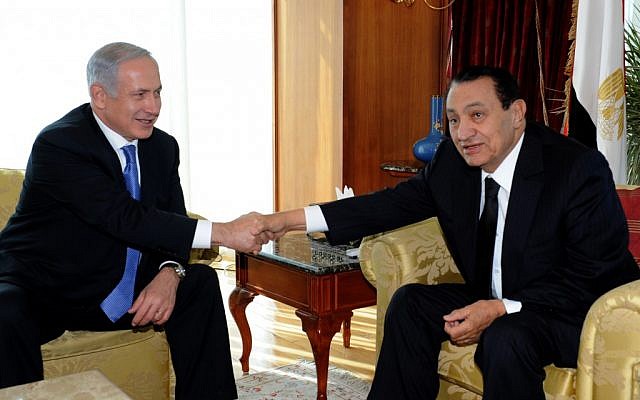
Benjamin Netanyahu (left) and Hosni Mubarak at Sharm Al-Sheikh, in January 2011 (photo: Moshe Milner/GPO)
Mubarak’s fall might have been a disaster in Israeli eyes, but Netanyahu had few options to protect Israel’s ally.
“I think Israel’s influence was limited as the US saw its own ability to change things as limited,” said Daniel Byman, senior fellow at the Center for Middle East Policy at the Brookings Institution.
For Israel, the US-backed ouster of Mubarak was seen as a major blow to Israel’s peace agreement with Egypt. Netanyahu urged Obama and European leaders to ensure that the Egyptians honor the deal if they wish to gain legitimacy in Western eyes.
“We can do one only thing, warn the international community that they should put pressure on Egypt to keep the peace with Israel, whatever government emerges,” former Israeli ambassador Zvi Mazel told VOA news at the time. “If it is the Muslim Brotherhood, there will be, it may lead, it may lead to war. But is this the wish of the people of Egypt, to go back to war?”
Many also saw Obama’s abandonment of Mubarak, after days of mounting pressure and protests, as dangerously naive idealism on the part of the US administration.

US President Barack Obama meeting with members of his national security team to discuss the situation in Egypt, in the Situation Room of the White House in Washington (AP/White House Photo, Pete Souza)
The Obama administration “should have also thought about Israel before hurrying to call upon Mubarak to go,” Dov Weisglass, a former aide to Ariel Sharon, wrote at the time, according to Politico. “It is difficult to think of more serious harm to Israel’s security than the collapse of the peace accord with Egypt.”
Israeli officials did not feel there was much chance that the idealist young Egyptians in Tahrir Square would succeed in taking power. It would either be Egypt’s generals in the best-case scenario, or the Muslim Brotherhood.
“Many Israeli officials were very worried. They felt that the familiar ground was shaking and that the consequences could be unpredictable, especially in Egypt,” said Brun.
As feared, following Mubarak’s exit voices swiftly emerged calling the Egypt-Israel peace agreement into question. Muslim Brotherhood leader Mohammed Badie called for the newly elected parliament to “loudly demand to stop the issue of normalization…and to review the Camp David Accord.”
On Israel’s southern border with Egypt, security along the once-quiet frontier began to dissipate as the transitional government under Field Marshal Hussein Tantawi came into power to replace Mubarak.
A jihadist insurgency in the restive northern Sinai gained steam, seemingly bolstered by Gazan terrorists.
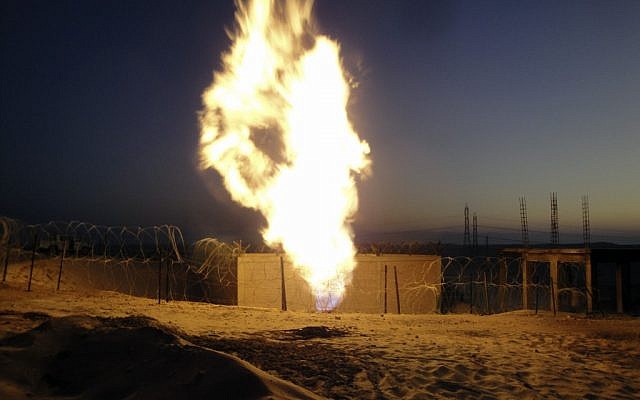
Illustrative: A gas pipeline in the Sinai Peninsula sabotaged by a jihadist group in 2012. (AP/File)
On April 7, 2011, terrorists in Gaza fired an anti-aircraft missile at a school bus in Israel, killing a 16-year-old boy. On August 18, a series of cross-border attacks from the Sinai left 8 Israeli soldiers and civilians dead. Attacks on a gas pipeline to Israel running through the peninsula became a regular occurrence, leading to fears that Israel’s energy supply would be choked off.
“All the fears of the Israeli political and military establishment were playing out,” said Brun. “We thought that this is what would happen and in a very short time, that was exactly what was happening.”
Israel understood it was entering a period marked by uncertainty. “The previous order that we knew had collapsed, we understood that the new order had yet to take shape,” said Brun. “Therefore, what we said to the senior military leadership and to the political echelon was that we are going into a transitional period that will be marked by uncertainty, instability, and volatility.”
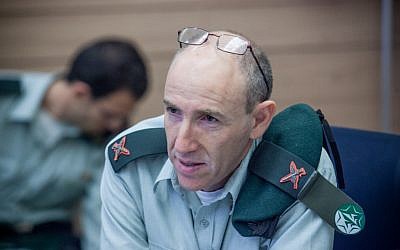
Brig. Gen. Itai Brun, head of the IDF Military Intelligence research and analysis division, at a Foreign Affairs and Defense committee hearing at the Knesset in 2012 (Noam Moskowitz/Flash90)
Despite the familiar faces in charge of the country, Egypt’s military government took actions that worried Israel, including opening up the border crossing with Rafah in the Hamas-controlled Gaza Strip.
Israel tried to learn the new regime and create channels of dialogue. “Tantawi was a known figure,” said Brun. “The feeling was that one could do business with him in a way that at least was reminiscent of Mubarak.”
But that wasn’t always the case. In September 2011, after the killing of six Egyptian soldiers by Israeli troops who were pursuing Palestinian terrorists near the Egyptian border during the August attacks, thousands of protesters tore down a security wall around a high-rise building housing the Israeli Embassy in Cairo and ransacked its offices.
Obama called on the Egyptian government to “honor its obligations to safeguard the security of the Israeli embassy,” according to a White House statement at the time.
Following the US intervention, Egypt sent commando forces into the embassy complex to rescue the Israeli staff, who had taken refuge in a safe room. Years later, Netanyahu claimed he had been planning a raid to rescue the staff, though Foreign Ministry officials cast doubt on the prime minister’s version of events.
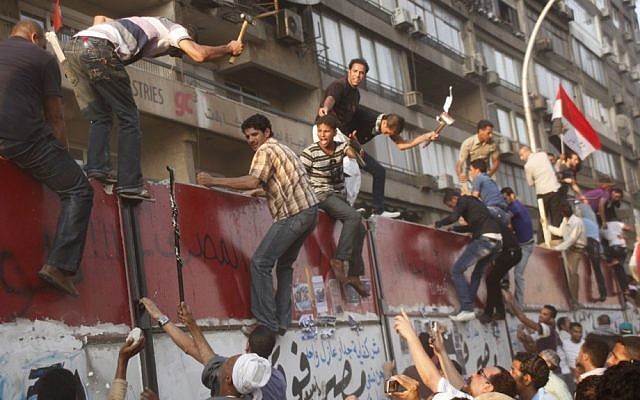
Egyptian protesters demolish a concrete wall protecting the Israeli embassy in Cairo, September 9, 2011. ( AP/Amr Nabil)
The attack prompted nearly the entire embassy staff to evacuate in one of the worst crises to hit the two countries’ relations since their 1979 peace treaty. Israeli officials said they tried frantically to reach their Egyptian counterparts, but were ignored.
The Muslim Brotherhood in charge
Nearly a year and a half after Mubarak was pushed out, Israel’s fears of a transition to democracy paving the way for an Islamist takeover were realized when Muslim Brotherhood candidate Mohammed Morsi won the presidential elections.
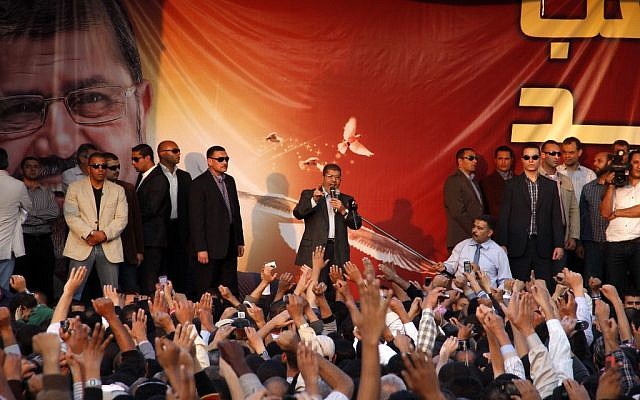
Egyptian President Mohammed Morsi speaks to supporters outside the Presidential palace in Cairo, Egypt, November 23 (AP/Aly Hazaza, El Shorouk)
“A lot of people were very worried,” Ksenia Svetlova, a former Knesset member and fellow at Mitvim – The Israeli Institute for Regional Foreign Policies.
But Israel still held out hope it could work with Morsi, who reportedly told a Mossad agent that he had no intention of severing ties with the Jewish state, and was encouraged by the fact that much of the military leadership was left in place.
“There was still hope that it will be possible to work with [the generals],” said Svetlova, who contributes to Times of Israel Hebrew-language sister site Zman Yisrael. “They had less influence, but they still had influence.”
While Jerusalem and Cairo were perhaps farther apart than they had been in years, Israel still found ways to work with Morsi, mostly through defense operations.
Israel prioritized tangible expressions of continued security cooperation, said Moshe Albo, a modern Middle East historian and researcher at the Dado Center for Interdisciplinary Military Studies. This meant a focus on cooperation on border security, the continued functioning of the embassy in Cairo, and military attaches remaining in both countries.
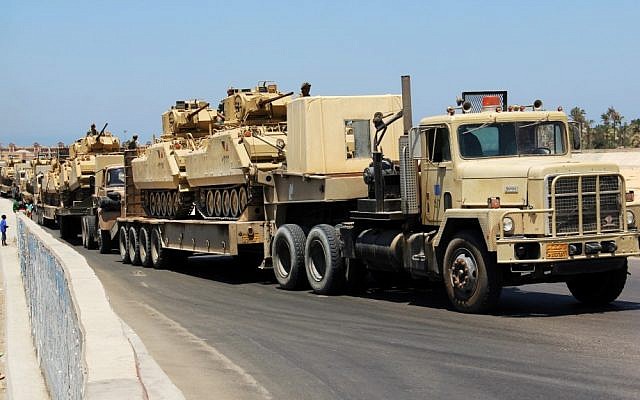
Army trucks carry Egyptian military tanks in Egypt’s northern Sinai Peninsula, August 9, 2012. (AP)
“The focus was on security, then after that was settled they could discuss trade deals, etcetera,” said Albo.
As security in the Sinai, Gaza and southern Israel continued to deteriorate, Israel reportedly allowed Egypt to deploy extra troops, tanks and attack helicopters in the Sinai Peninsula in an attempt to crack down on terrorist groups in the region.
By November 2012, as Israel embarked on a three-week air campaign against Hamas to stem rocket attacks from Gaza, Egypt was able to play a role in helping broker a ceasefire, partially thanks to the fact that it had a Muslim Brotherhood Islamist in power.
The close ties between the Muslim Brotherhood and Hamas were seen as an advantage by Israel, said Brun. “It was clear that the Egyptian mediation could help for the speedy conclusion of the operation,” he said.
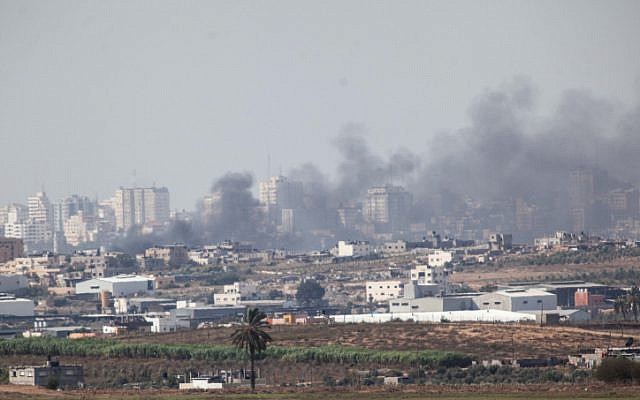
Smoke rises from a building in the northern Gaza Strip after an Israeli airstrike on November 16, 2012 during Operation Pillar of Defense. (Uri Lenz/Flash90)
Egypt had a profound interest in stability at the time and sought to play an active role in the region, according to Yossi Kuperwasser, who was then director-general of the Strategic Affairs Ministry.
“The fact that we enabled Egypt, under president Morsi at the time, to play a role, a positive role, in stabilizing the situation… I think this was very important,” he said.
At the same time, the Muslim Brotherhood-Hamas ties came with downsides for Israel. With Morsi in power, Hamas enjoyed a period of relative legitimacy on the international stage after the operation. In late 2012 and early 2013, it hosted visits to the Gaza Strip by the foreign ministers of Turkey and Tunisia, the prime ministers of Egypt and Malaysia, and the influential emir of Qatar.
The military strikes back
By the end of 2013, Israel had survived Egypt’s dalliance with democracy and was welcoming the rise of a new strongman, defense chief Abdel-Fattah el-Sissi, who ousted Morsi in a coup, ending his year of divisive rule.
“He was certainly seen as a figure whose orientation was similar to the regime before the Muslim Brotherhood,” Brun said of Sissi.

Egyptian Minister of Defense Lt. Gen. Abdel-Fattah el-Sissi meets with Egyptian President Mohammed Morsi at the presidential headquarters in Cairo, Egypt, February 21, 2013. (AP/Mohammed Abd El Moaty, Egyptian Presidency)
Israel’s cooperation with Egypt under Sissi deepened around security and energy.
An annex of the 1979 peace accord giving Israel say over the scope of Egyptian military deployments swiftly became irrelevant as Cairo was given carte blanche, according to Israeli officials, a sign that Jerusalem was not concerned big Egyptian guns could be turned against it.
According to foreign reports, Israel has helped the Egyptian military crack down on the jihadist insurgency in the Sinai with its own bombing campaign, and Egypt has taken part in efforts to stunt Hamas in Gaza.
In 2014, an Egyptian court banned Hamas from operating in Egypt and ordered the seizure of its assets there.
Sissi also ordered the razing of homes to create a buffer zone with the Gaza Strip. In March 2014, Egypt’s military announced it had destroyed 1,370 smuggling tunnels under its border with the Gaza Strip.
When war broke out again in the Strip in July 2014 with Operation Protective Edge, private and public Egyptian media channels bitterly criticized Hamas for provoking another conflict with Israel.
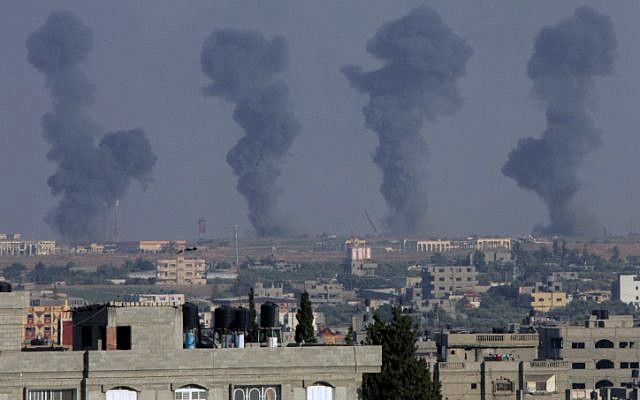
Black smoke rises after an Israeli airstrike on the Gaza International Airport in Rafah, southern Gaza, on July 7, 2014. (Abed Rahim Khatib/Flash90)
“The Egyptian reactions represent a dramatic change of course,” said Mira Tzoreff, who teaches Egyptian politics at Tel Aviv University’s Middle East and African Studies Department and the Moshe Dayan Center. “This didn’t begin with Operation Protective Edge but with Sissi coming to power, when he clarified who Egypt’s enemy is and what he plans to do with such an enemy… Sissi was exploding tunnels in the Sinai before we [in Israel] ever dreamed of exploding tunnels.”
In January 2019, CBS News asked Sissi if defense cooperation between Cairo and Jerusalem was tighter than it had ever been. “That is correct… We have a wide range of cooperation with the Israelis,” he said.
Today, Egypt has emerged as the one country that can effectively mediate between Israel and Hamas, sidelining Turkish and Qatari attempts to end the conflict and boost their standing.
The two sides also found common ground on energy cooperation as gas deposits found in the Eastern Mediterranean opened the door to new opportunities for both countries. With Egypt and Turkey on opposite sides of the Libyan civil war — another violent legacy of the Arab Spring — Cairo, Jerusalem and other players came together to form the East Mediterranean Gas Forum as a bulwark against aggressive Turkish moves in the region.
Still, the same issues that dogged the Israel-Egypt relationship before February 2011 continue to do so. Powerful forces in Egyptian society that oppose normalization with Israel hinder a blossoming of ties. Hostility to Israel among elite civil society — the press, writers, academics — combined with popular anti-Semitism has tempered any public expressions of warmth.
While Mubarak met regularly with Israeli leaders, including Netanyahu, Sissi has avoided public meetings with the Israeli leader.
And yet, a decade after Israeli officials worried popular protests in Egypt would snowball into open war between the countries, Cairo and Jerusalem enjoy ties that appear to be closer than they were even under Mubarak. Everything Israel feared did come to pass — Islamists elected to power, instability, a deadly insurgency on the border, a pullback of US influence — but in the end what appears to be the only lasting effect of the Arab Spring in Egypt is a stronger Israel-Egypt pact.
“In the end, the strategic situation of Israel became more comfortable,” Brun pointed out, “but that isn’t only the regional shakeup. It’s also the Trump administration, and other factors, but when we look back, I think that Israel is one of the countries that gained the most from the regional shakeup, because the undermining of our adversaries was ultimately beneficial for Israel.”
The Syrian bloodbath
In Egypt, Israel found a way to navigate the upheavals of the Arab Spring by rolling with the punches and seeking ways to turn challenges into opportunities. The same holds true for its approach to Syria, though the outcome and the way it got there were radically different in many key ways.
As with Egypt, Israeli leaders watched with worry as popular protests snowballed into something larger, in this case an open civil war. While there was no love lost in Jerusalem for the Bashar Assad regime, and many Israelis hoped that Syrians would throw off the yoke of oppression, there was also fear, with risks for Israel whether Assad was overthrown or remained.
Since it could not get a sense of how events would unfold, Israel mainly prepared for a range of scenarios.

Syrian President Bashar Assad, left, speaks with Syrian troops during his visit to the strategic town of Habeet, in the northwestern province of Idlib, Syria, October 22, 2019. (Facebook page of the Syrian Presidency via AP)
“We understood quickly that there were two possibilities. First, that Bashar or some successor from the Assad order would survive and would be part of enhancing Iran and Hezbollah’s influence in Syria, and second, that he would fall, and that would be connected to the presence of jihadists on our northern border,” Brun said.
Israel focused on understanding how the conflict was unfolding instead of trying to influence its course. This decision seemed quite reasonable at the time.
Among other things, the country was still dealing with the trauma of the Lebanon occupation, in which its attempts to intervene in the domestic politics of an Arab country led to an 18-year quagmire that left hundreds of IDF soldiers dead.
“It is not clear to me what Israel could have done beyond individual operations in the Syrian war,” said Byman. “Staying out helped ensure that this important (and divisive) event in the region was not ‘about Israel’ and made it easier, over time, for Israel to work with Gulf states and other future allies.”
There were three exceptions to the policy to remain on the sidelines. Israel would respond to shells that landed in its territory, offer covert humanitarian aid, and use airstrikes to keep weapons of mass destruction from falling into terrorist hands and precision missiles from reaching Hezbollah from Iran.
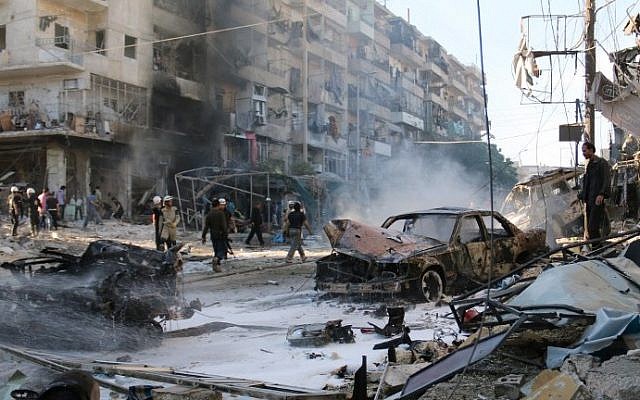
Syrians gather at the site of reported air strikes by government forces on May 1, 2014 in the Halak neighborhood in northeastern Aleppo (photo credit: AFP/AMC/Zein Al-Rifai)
It also resisted getting involved to defend the relatives of Syrian Druze residents of the Golan Heights, most of whom have not claimed Israeli citizenship and backed the Assad regime, from being threatened or attacked by rebel groups across the border.
However, it did provide medical aid to anyone who showed up at the border needing help, whether Syrian regulars or rebels, angering Druze who had seen terror groups allied with opposition forces carry out alleged atrocities against their brethren across the border.

Young members of the Druze community wave Syrian flags during a rally in the Druze village of Majdal Shams in the Golan Heights on October 6, 2018, commemorating the 45th anniversary of the 1973 Arab-Israeli war (AFP Photo/Jalaa Marey)
In June 2015, after a massacre of 20 Druze villagers by Al-Nusra Front fighters, Druze men ambushed an Israeli ambulance and killed a wounded Syrian who was being transported for medical treatment in the Golan Heights. Days later, Defense Minister Moshe Ya’alon confirmed that Israel had been providing aid to Syrian rebels, on the condition they did not harm the Druze.
In November 2017, Israel said it would defend the Syrian Druze village Hader, hours after a terrorist from the Al-Nusra Front killed nine people in a suicide bombing just across the border that sparked clashes between Syrian government forces and rebels.
Some reports indicated that Israel sought to create a more robust buffer zone on the border that would last beyond the civil war. Opposition activists claimed Israel was providing salaries for armed groups that would keep pro-Iranian elements from the border area. If there was such an effort, it failed.

An IDF ambulance that was attacked by Druze Israeli residents in the Golan Heights as it ferried Syrian war casualties into Israel for medical treatment, June 22, 2015. (Basel Awidat/Flash90)
“Israel did not succeed in establishing a buffer zone,” said Svetlova.
Though Israel managed to avoid being sucked into the fight while largely keeping it from spilling over into Israel, there were some drawbacks to its policy.
Some groups just over the border expected more out of Israel, and were left disappointed. “It seems that it’s never a good idea to betray allies,” said Svetlova. “Next time, it will be more and more difficult for Israel to look for allies across the border when we need them.”
As for the Assad regime, Israel deemed it preferable to stick with the devil it knew — the phrase prime minister Ariel Sharon used in 2005 to convince George W. Bush not to push for regime change in Syria.
The Syrian border had been Israel’s quietest since 1973, and should the regime fall, Israeli leaders reasoned, it would be replaced with Sunni jihadists who would be far more aggressive.
“We were really concerned about the possibility in those years that chemical weapons — there was a very large store of chemical weapons, including material, missiles that can carry chemical weapons — the possibility that these would find their way to less responsible actors, some of which were hostile,” Brun explained.
As the Syrian war ground on, though, that view began to change.
“I think in the last few years Israel started to realize that it wasn’t that accurate to assume that Bashar Assad is a better option for us,” said Itamar Rabinovich, a former lead Israeli negotiator with Syria and author of the new work “Syrian Requiem.”
“First of all, from a strategic point of view, Israel today acknowledges the fact that Bashar is the one to allow the Iranian entrenchment in Syria. And as long as it’s up to him, he will not do anything in order to remove the Iranian presence.”
“We do know that Iran is much stronger,” Svetlova stressed. “It has a much stronger presence in Syria than it did 10 years ago or even five years ago.”
Limited involvement in Syria
By 2013, Israel understood that the situation in Syria offered an opportunity. The fraying Syrian army meant that Israel enjoyed unprecedented freedom of action in the country to fight against Iranian entrenchment and Hezbollah’s military buildup. The IDF effort that emerged from that understanding was called the “campaign between wars,” or Mabam in its Hebrew acronym.
In May 2013, Israel began acknowledging generally that it was taking military action in Syria against Iranian missile shipments to Hezbollah, in addition to sites like Syrian chemical weapons facilities, which Obama publicly supported. Israeli officials mostly avoided commenting on specific incidents, which relieved pressure on Assad to retaliate. In 2017, the IAF acknowledged it had struck nearly 100 Syrian and Hezbollah targets since the beginning of the civil war.
Israel ramped up its attacks as time went on. In 2018, Israel accused Iran of firing 20 rockets from Syria at IDF positions, the first time Israel had directly accused Tehran of firing at Israel. According to Israeli officials, IAF planes retaliated in a massive operation by striking logistics and intelligence sites used by Iranian forces in Syria. According to the UK-based Syrian Observatory for Human Rights, in a one-month period in 2018 alone, Israeli strikes killed 113 Iranian soldiers and allied militiamen. The IDF said at the time that it had struck over 200 Iranian targets in Syria that year.
Despite the Israeli campaign, Iran has continued to push ahead with its efforts to establish a bridgehead on Israel’s border to threaten the Jewish state, and has advanced plans for a range of attacks, according to Israel’s military. In January 2015, an IAF strike targeted the leaders of a substantial new Hezbollah terror hierarchy that was set to attempt kidnappings, rocket attacks and other assaults on military and civilian targets in northern Israel.
In recent years, Iran has also attempted to send attack drones into Israel. In August 2019, the military said it carried out bombing runs to thwart an Iranian Revolutionary Guard Corps plot involving what were described as “kamikaze” attack UAVs.
Each Israeli strike, though, carries risks of inviting reprisal attacks or snowballing into a larger conflagration. Making the theater even more serious from an Israeli perspective is the fact that Russia too has attempted to exploit the chaos for its own gains.
In 2015, Russia moved forces to Syria to ensure Assad’s survival. Israel had to flex its muscles to set down clear red lines that the Russians would understand, and it turned to an Arab security partner to do so. According to Jordan’s King Abdullah, in January 2016, Israeli and Jordanian jets together confronted Russian warplanes over southern Syria and warned them away from crossing their shared border.
“We saw the Russians fly down, but they were met with Israeli and Jordanian F-16s, both together in Israeli and Jordanian airspace. The Russians were shocked and understood they cannot mess with us,” the Hashemite king was quoted saying at the time.
Israel and Russia established a so-called deconfliction mechanism to keep the sides from getting tangled up and Netanyahu met Russian President Vladimir Putin on multiple occasions to discuss the issue.
Israeli officials do not generally discuss the full extent of that coordination, but they stress that the Israeli military does not seek Russian permission before carrying out operations. At the same time, though, Israel’s freedom of action was seriously curtailed, especially after Russia provided advanced S-300 air defense batteries to Syria following an incident in which a Syria gunner, aiming for Israeli jets, knocked a Russian plane out of the sky instead, killing all 15 people on board.
It is clear that Iran is not about to stop sending Iranian troops and its proxy militias to Syria to attempt to carry out attacks against Israel. For its part, Israel has shown a firm resolve not to let that happen, and has shown that its intelligence and operational capabilities give it a distinct advantage over Iran in Syria.
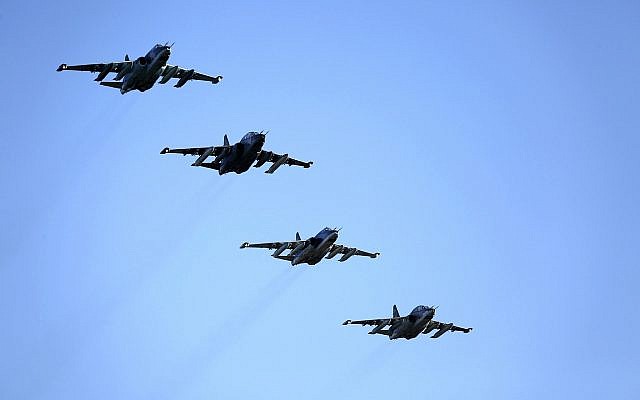
Russian Su-25 ground attack jets prepare to land after returning from Syria at a Russian air base in Primorsko-Akhtarsk, southern Russia, March 16, 2016. (Olga Balashova/Russian Defense Ministry Press Service via AP)
Russia as well is here to stay, along with its advanced air defense systems that could threaten Israel’s dominance of the skies over Syria. “Our freedom of action is in the hands of the Russians,” said Svetlova. “It’s not a Syrian-Israeli issue anymore. It’s a Syrian-Russian-Israeli issue.”

Illustrative: In this image released on Friday, June 23, 2017, long-range Kalibr cruise missiles are launched by a Russian Navy ship in the eastern Mediterranean. (Russian Defense Ministry Press Service via AP)
Russia’s growing naval presence in the Mediterranean, based in Tartus, Syria, could also limit Israel freedom of action at sea.
Russian anti-aircraft forces in Syria provide a protective umbrella for Russian ships, potentially complicating Israeli air operations in the area. In addition, Russia’s advanced intelligence systems mean they are constantly tracking Israeli movements, and potentially transferring that information to Syria or even Hezbollah.
Over the decade of civil war just over Israel’s border, Netanyahu managed to keep Israel from getting sucked into the conflict. Israel’s initial focus on chemical weapons shifted to Iranian entrenchment, which it has combated with purpose and effectiveness. But the fact remains that a hostile regime is in power, backed by Iran, a determined foe of Israel, and propped up by Russia, a world power that could turn quite dangerous.
“I think the fact that Bashar remained is a negative outcome,” Brun reflected. “Still, it’s not that that simple because I also agree that he does provide some sort of stability; he’s a responsible actor, we know him, we know how he will act, more or less. But in my eyes, the presence of Iran and Hezbollah in Syria — and even the moral side of him remaining in power after he killed so many people, he crossed too many international norms, he used chemical weapons — that is an extremely negative outcome in terms of the liberal democratic order in the world.”
Adversaries on the defensive
Israel had much to fear 10 years ago. But the scenarios its leaders feared either didn’t come to pass, or occurred at a much lower level than expected. Chemical weapons did not reach the hands of terrorists; Egypt remains very much committed to security cooperation with Israel; jihadist organizations did not emerge as a major threat to Israeli citizens or soldiers; King Abdullah sits securely on the throne in Jordan.
The outcome is even better when one surveys how Israel’s adversaries fared. Iran, which enjoyed a wave of success in the early years of the Arab Spring, has been on the defensive of late. Senior commanders like Qassem Soleimani and key allies have been killed, it continues to suffer stunning intelligence failures around its nuclear program and its economy is in shambles under US sanctions.
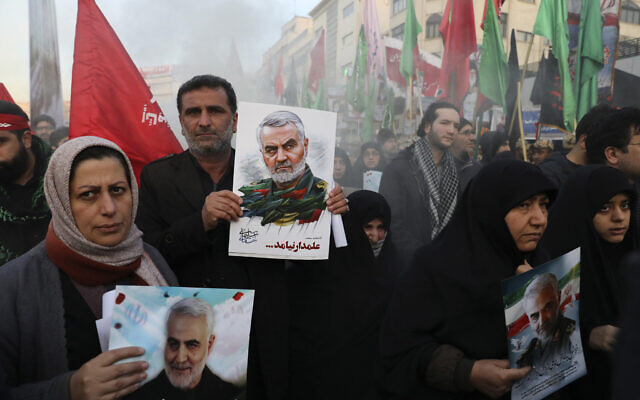
Mourners holding posters of Iranian Gen. Qassem Soleimani attend a funeral ceremony for him and his comrades, who were killed in Iraq in a US drone strike on Friday, at the Enqelab-e-Eslami (Islamic Revolution) Square in Tehran, Iran, Jan. 6, 2020. (AP Photo/Ebrahim Noroozi)
The Sunni jihadist networks have also been hit hard. The Islamic State’s caliphate was smashed, and al-Qaeda-linked groups have rejected it in Syria as senior leaders continue to be eliminated or spend long stretches in hiding.
At the same time, moderate Sunni states have come together around opposition to Iran and Turkey, while signing normalization agreements with Israel.
Though a number of factors played into the outcome, Netanyahu is credited for his leadership in navigating the drastic changes over the last decade, even by many who are not supporters of his policies in other realms.
“I personally disagree with Netanyahu’s views on peace with the Palestinians and the JCPOA,” said Byman, of the Brookings Institution. “However, given his beliefs, he played his hand very well. He helped foster discontent with the [Iran nuclear deal], which Trump withdrew from, and in general was able to use Iran to forge new relations with important states like the UAE. More broadly, he was able to work with Russia — though it was often difficult — as the US decreased its role in the region. Overall, Israel has emerged from the last decade with new or stronger ties to important regional players and has not had to make concessions on the Palestinian issue.”

MK Ksenia Svetlova of the Zionist Union party as a new member of the Israeli Knesset, March 29, 2015. (Miriam Alster/FLASH90)
“I think that some of his decisions have been correct,” said Svetlova, who served in the opposition as an MK while Netanyahu was prime minister, “such as the non-involvement in the Syrian civil war.”
Looking at the entire period, Netanyahu’s overall policy was correct, said Brun. “Israel took advantage of the chaos, or the war, to operate with relative intensity against existing and emerging threats. “
Times of Israel staff and The Associated Press contributed to this report.
Related posts:
Views: 0
 RSS Feed
RSS Feed

















 April 16th, 2021
April 16th, 2021  FAKE NEWS for the Zionist agenda
FAKE NEWS for the Zionist agenda 
 Posted in
Posted in  Tags:
Tags: 
















